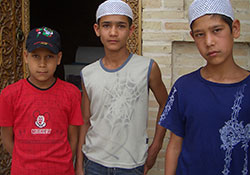Child health

WHO/Malin Bring
Improving child health involves joined-up policy-making. WHO/Europe helps countries reform their health systems to deliver integrated, effective care in a continuum, starting with a healthy pregnancy for the mother, through birth and care up to 5 years of age and beyond.
The leading causes of death of children under 5 in the European Region are: neonatal conditions, pneumonia and diarrhoea. Almost half the deaths are associated with undernutrition. Children are also at risk from: hazardous environments, obesity and unhealthy lifestyles.
WHO/Europe works with countries to reduce these threats, and thus move closer to attaining the Millennium Development Goals, particularly Goals 4 and 5 on reduction of child mortality and improving maternal health.
Making progress involves highlighting the best clinical practice based on robust evidence, and then developing new ways of working that are appropriate for each country. This usually means changing professional attitudes and giving service users a greater say, more information and increased involvement in their own care. Many sectors influence health, and an intersectoral approach is important.



